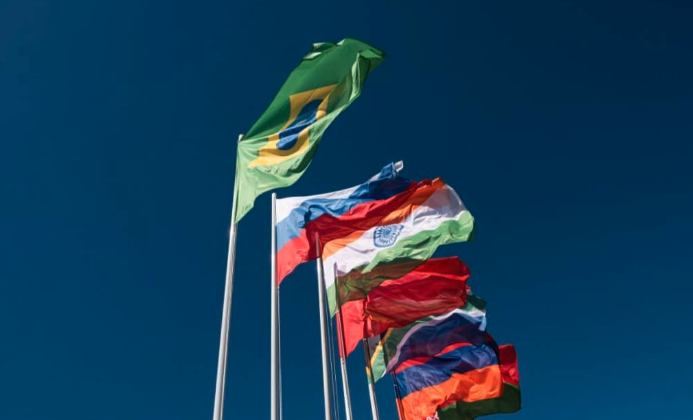Geopolitical influence trumps economic gain as the UAE and Saudi Arabia’s accession to BRICS signals shifting alliances amid an emerging “new world order”
The UAE and Saudi Arabia’s entry into the BRICS coalition may wield geopolitical advantage in the near term but promises limited economic gains, experts told Arabian Business.
The two nations are expected to join the BRICS group of emerging economies in 2024, according to an announcement made at its annual summit in Johannesburg last month, raising many questions about what this could mean for the Gulf region and how the UAE and Saudi will be impacted economically as a result.
The BRICS group, which currently includes Brazil, Russia, India, China, and South Africa, is one of the most important economic blocs in the world, accounting for over 40 percent of the world’s population and 25 percent of global GDP. Apart from the UAE and Saudi, the group has agreed to invite Ethiopia, Egypt, Iran and Argentina.
This expansion would add more heft to the bloc’s economic influence and augment its ambition to be a counterweight to Western powers. However, tensions might persist between members seeking closer alignment against the West and those nurturing ties to the US and Europe.
As major emerging economies, the UAE and Saudi Arabia will have a greater voice in global affairs once they officially join the bloc. While this is set to boost their economic cooperation with other member states, it does not pose the same benefit for their own individual economies in the short-term.
“We expect limited near-term economic benefits for Saudi Arabia and the UAE as a direct consequence of joining BRICS,” Director of Sovereign Ratings at S&P Global Ratings, Zahabia Gupta, told Arabian Business.
“Higher bilateral trade cooperation and investment links with BRICS countries are possible but not certain given the track record among the original BRICS members. China and India are already key trade partners and importers of Gulf oil.”
This view was echoed by economist Omar Al-Ubaydli of Bahrain-based thinktank DERASAT, who said there will be “no materially perceptible benefits” in an economic sense. Rather than achieving a higher return, Al-Ubaydli framed it as a move aimed at “hedging and diversifying relationships” to safeguard against potential downturns.
Specifically, key Gulf exports like oil and gas may see added insulation from downturn risks through broader markets. However, concrete impact on trade volumes or specific sectors is far from guaranteed according to the analyses. As Al-Ubaydli stressed, “nothing in particular will be impacted positively.”
UAE, Saudi work to boost sway in ‘new world order’
So if near-term commercial gains are uncertain, what broader motivations lie behind Saudi and UAE ascension to the BRICS bloc? Geopolitical strategy appears a stronger driver than narrow profit motives.
Gupta cited the Gulf states’ objective to “expand their geopolitical influence beyond the Middle East and parts of Africa” as a “more compelling reason.”
Similarly, Al-Ubaydli framed it as a means for GCC countries to position themselves advantageously in an evolving “new world order,” avoiding relegation as sidelines observers of others’ arrangements.
“A new world order is emerging, and the GCC is positioning itself in that world order to make sure its interests are protected. It will not be an idle bystander as other countries make their own arrangements,” he said.
International bodies like the IMF have cautiously endorsed expansion of cooperation between country groupings that promote inclusive multilateralism. However, an IMF spokesperson emphasised the need to also strengthen overarching frameworks upholding open trade, growth and stability.
With fluid power dynamics reshaping the global landscape, membership in emerging partnerships like BRICS could theoretically boost Saudi and UAE geostrategic leverage. Yet concrete political impacts may be conditional on the bloc maturing into a cooperative force with shared priorities and outcomes – no sure bet according to observers.
As the two Gulf nations look to expand their geopolitical influence, they should bear in mind that this could require “a balancing act given their strong security ties with the US,” said Gupta.
“The success of the new BRICS group as a political and economic grouping will depend on whether the countries can align on priorities and outcomes despite varying levels of economic development and diverse financial and political systems.”
The IMF told Arabian Business that countries in the bloc should aim to reduce market fragmentation as well as trade and investment costs among members, “rather than discriminate towards non-members.”
“All countries should aim at strengthening the multilateral institutions that provide global public goods such as open trade and the framework for macroeconomic growth and stability and are the indispensable complement to integration initiatives by grouping of countries,” the IMF spokesperson said in an emailed statement exclusively for Arabian Business.
BRICS cohesion challenges persist
As it stands, Al-Ubaydli terms BRICS an “intergovernmental forum” where divergences routinely surface between members with disparate development levels and systems. Unless internal cohesion strengthens policy synchronicity, external influence will remain diffuse.
“BRICS may have a strong future, but for the time being, it is not a mature entity with substantive powers; it is more of an intergovernmental forum, and many of its members disagree on critical issues. Therefore, for the time being, it is more of a symbolic decision by the GCC countries than a pivotal one,” he explained.
“Whether or not it turns into something more important depends upon the willingness of the BRICS countries to forge a more sophisticated system.”
While economic rewards appear murky, managing geopolitical positioning amid transitional currents clearly drove the Gulf’s calculus. Whether BRICS actualises as an effective platform depends on its own evolution. For now, benefits hinge more on symbolic deflection of multipolarity than material returns on investment
SOURCE&CREDITS: arabianbusiness.com

